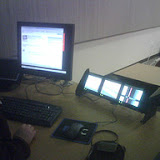I did catch an interest radio piece on KUOW, part of a series from the Cunard Cruise Lines called Liner Notes. Episode 6 (Talking Turkey) contained an interview with author Wendell Berry. Around 51 minutes into the podcast the interviewer asks Mr. Berry what advice he, a frequent commencement speaker, gives young people about leading a successful life. He says his comments always go against the grain because:
... I think what they are being taught is how to be good employees, which means to be dependent and obedient and so on, and I encourage them to try for independence.Argue if you will about whether the goal of school is to create good employees or educated citizens (are the two really mutually exclusive?), but I can assure Mr. Berry that "dependent and obedient" is the very definition of a poor employee, certainly in the modern information technology (IT) organization. The world of routine, process-oriented jobs, where employees follow orders from a boss with superior knowledge is fading fast. Organizations are flat, managerial span of control wide, knowledge fleeting and work project-oriented. I would consider the 3 skills Alan November highlights in this short video clip as more accurate representation of what good employees need to be taught.
My concern, however, is not that Mr. Berry's assessment of hiring standards is accurate (it's not). My fear is that his assessment of education might be accurate. I know teachers and administrators are going to say we don't teach those things and I know that's not their intent. I am confident that there isn't an AP Obedience class anywhere in the country. Still, I wonder if the very organization of school and the behaviors it models doesn't encourage some dependent and obedient behaviors. I'm thinking of the focus on lecturing, the teacher as the expert ("the sage on the stage"), the rigorous structuring of the class day and standardized testing the reinforces the notion of "one right answer".
This gets tricky because, if we are modeling the wrong behaviors, then the discussion can't be between a couple of teachers at Kamiak or Cascade or E-W and their respective technology advisory committees. Those behaviors are woven into the very fabric of the education system. Removing them is the job of the weaver, not the seamstress. That is why, as I have written before, there needs to be a discussion amongst the broader community - taxpayers, citizens, civic leaders, business leaders, teachers and administrators.
Tags: Wendell Berry, Alan November, Education, Employment Skills


